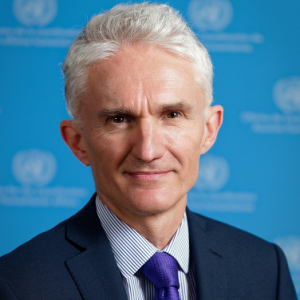I’d like to start by thanking the Kingdom of Saudi Arabia for organizing this important event. And thank you all for being here.
As David says, the bad news from Yemen can often seem relentless.
Over the last year, for example, we saw a very serious risk of widespread famine. We saw new cholera cases again surge in the worst outbreak ever recorded – just months after the epidemic had been brought under control. And we have seen hundreds of civilians killed and wounded, as well as some 350,000 people displaced by violence across the country.
Amidst this devastation, I am often asked: is there any cause for hope at all?
The answer is yes – and for several reasons.
First, the broad commitment among Member States to find a political solution to this crisis. As Martin Griffiths often reminds us, your commitment to peace helped to facilitate concrete progress on the political track over the last year, including the Stockholm Agreement.
I have long said the best thing anyone can do to alleviate the suffering in Yemen is to end the war. And so, it is encouraging that this work continues despite the many challenges. Of course, there remains much to do, and we offer Marin our full support.
A second reason for optimism is the track record of more than 200 humanitarian agencies working through the Yemen Humanitarian Response Plan. This year, agencies are reaching more than 12 million people every month. That makes Yemen not just the world’s worst crisis, but also the world’s largest aid operation. Despite all the access problems, the operation has consistently expanded to keep pace with people’s growing needs.
Take, for example, the extraordinary work of WFP. In 2017, WFP was reaching about 3 million people per month with emergency food assistance. Last month, they reached more than 12 million – that is a fourfold increase. And a record achievement that requires an enormous and extremely complex logistical operation.
We have good evidence that this scale-up was key in averting the widespread famine that was a very real threat this time last year. Agency programmes in other sectors have also resulted in progress in other areas, including cholera treatment, nutrition outcomes and rapid assistance for displaced people.
So, although conditions are still deteriorating in Yemen, humanitarian agencies remain reasonably successful – for now – in keeping the very worst at bay, provided they have the resources they need.
And that brings me to the third reason for optimism – the generosity shown by Member States in funding the aid operation.
A few moments ago, the Kingdom of Saudi Arabia presented the UN with a cheque for $500 million, which my office will allocate to agencies working on key priorities in the response plan. This approach saved millions of lives last year. It greatly strengthened the partnership between my office and the King Salman Centre, and between the Kingdom and the United Nations more generally.
With this funding, Saudi Arabia will have given nearly $700 million this year to the response plan, making them by far the largest contributor. Since 2015, the Kingdom has contributed more than $1.6 billion to UN response plans in Yemen. This has played an essential role in addressing hunger, treating cholera patients and a host of other activities.
It also comes on top of other Saudi support, including injections of foreign exchange into the Yemeni economy, which has in the past helped to stabilize the exchange rate and, by extension, help people to afford food and other essential goods.
Other donors have also shown great generosity this year. The United Arab Emirates and Kuwait have contributed $350 million this year, including $200 million given by the UAE in just the last ten days. Meanwhile, the United States, the United Kingdom, the European Union and Germany have all given at least $100 million so far this year. Thank you to all our donors. You support is making a huge difference.
And of course, I hope the response plan – which as of today will be about 56 per cent funded – will see even more contributions, including from other donors in the region.
Each of the points I’ve just touched on – political progress, response achievements and donor generosity – remind us that it is indeed possible to move forward in Yemen if we all work together. And fortunately, today’s event again confirms that we are all committed to doing so.
Thank you.









